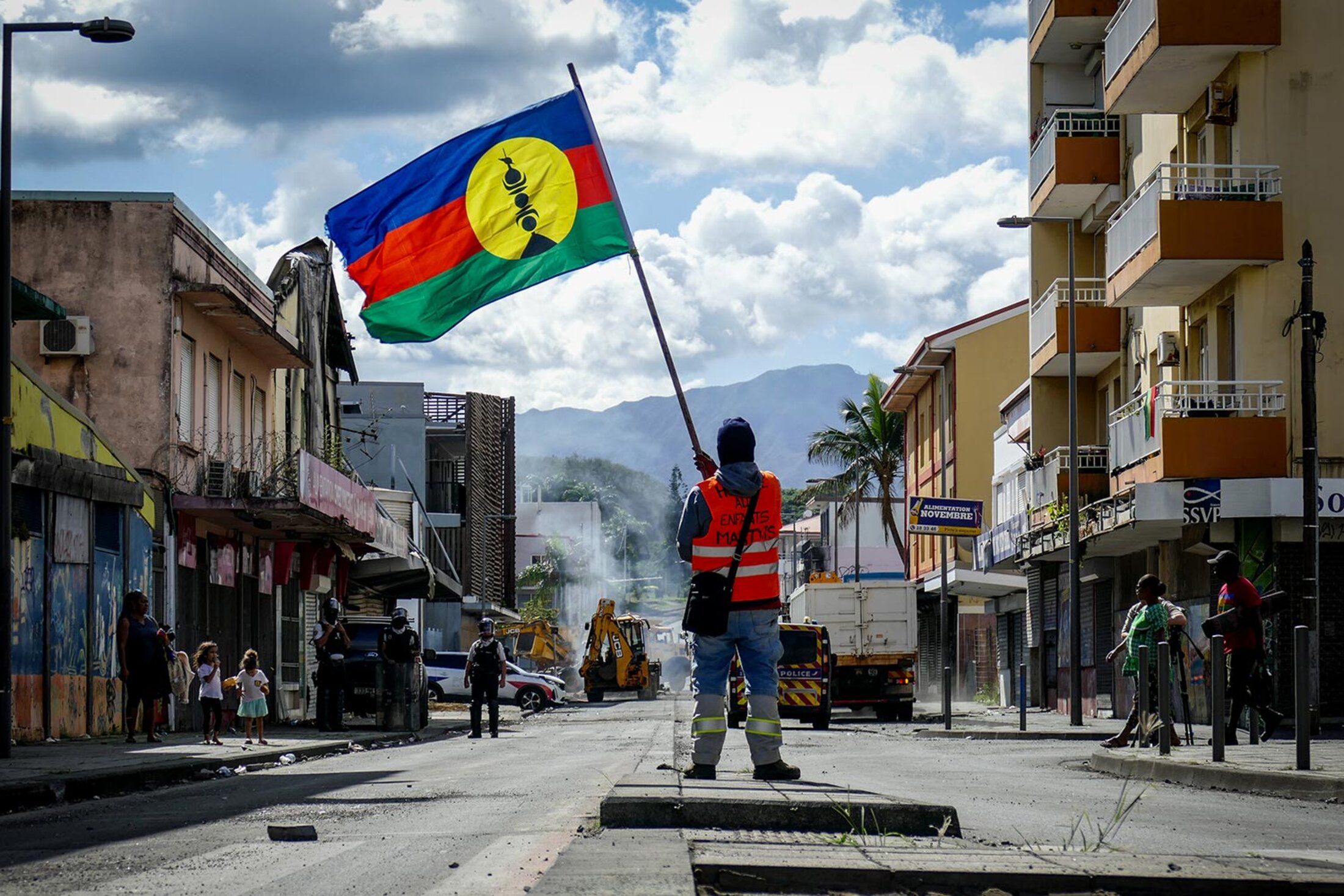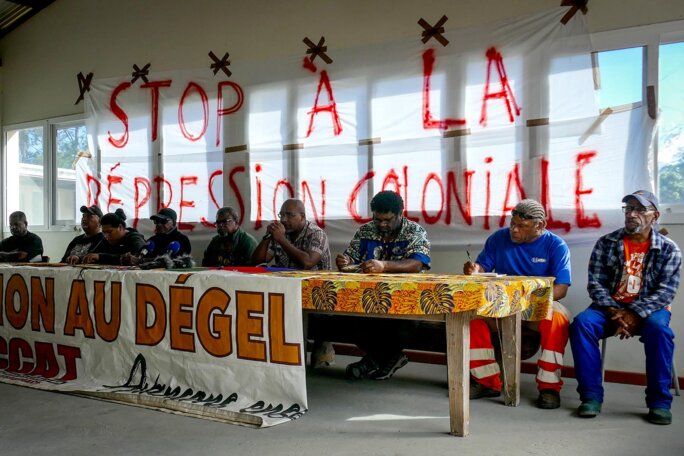Just a few days ago, the separatist protests were losing momentum and roadblocks were being re-erected ever more feebly after each pass of the diggers and the gendarmes' armoured vehicles tasked to destroy them. But since Saturday evening the mobilisation has gained new strength: the news that seven leaders of the pro-independence Coordination Group for Field Actions (CCAT) have been transferred to prison in mainland France, even before facing trial on potential charges connected to the recent unrest on the French Pacific territory, has re-stoked the flames of protest.
In recent days, clashes between young Kanaks – the indigenous people - and law enforcement officers have intensified around the Pont des Érudits, in the Koutio, Magenta, and Portes-de-Fer districts. In the northern suburbs of capital Nouméa a gendarmerie station was set on fire, followed by a school. And the violence has been gradually spreading to the rest of New Caledonia.
On Tuesday, in Bourail, where many residents of European descent live, gunfire was exchanged between residents and two houses were burned down, according to mayor Patrick Robelin. “It was a restless night and marked by disturbances across the entire Grande Terre, on the Île des Pins and Maré,” noted the High Commission in New Caledonia on Monday, regretting that gendarmes had once again been “attacked”.

Enlargement : Illustration 1

The blockades have been particularly numerous at Conception, the stronghold of Roch Wamytan, a traditional chief and president of the Congress of New Caledonia. The path to the local communal house is a maze of stones, metal, and tree branches – and there are also mounds of spent tear gas grenades on the final stretch. Several dozen people guard the access, searching cars.
The last time the CCAT tried to organise a press conference, on Wednesday June 19th, the police seized the opportunity to arrest several of its leaders. This was the first item on the agenda for the next such gathering. “These political deportations are colonial practices that have been carried out before in history,” says Dominique Fochi, secretary general of the Caledonian Union (UC), the leading independence party, which created the CCAT in November 2023 before later involving other political and trade union organisations.
The pre-trial detention of several of its members in mainland France “does not respect the rights of the defence nor human rights. It constitutes a significant political error,” says John-Rock Tindao. Tindao, the president of the Drubea-Kapumë traditional area council, which includes Nouméa, accuses the judges of having succumbed to pressure from the state and from radical opponents of independence.
'Martyrs of colonial justice'
Among the eleven people placed under investigation, nine have been remanded in custody. And seven of these have been flown to mainland France “due to the sensitivity of the case and to allow the investigations to proceed calmly, free from any pressure or fraudulent collusion”, according to the public prosecutor in New Caledonia, Yves Dupas. Among them are Christian Tein, leader of the CCAT, and Frédérique Muliava, chief of staff to Roch Wamytan.

Enlargement : Illustration 2

The criminal investigation has been conducted by the anti-terrorist branch, although the prosecutor stresses that the case does not fall under the heading of terrorism but rather organised crime. Yves Dupas also cites testimonies and “technical evidence” to assert that CCAT leaders “established, prepared, planned, and implemented a violent action plan to destabilise the territory”. Facing seven potential charges, including “aiding and abetting attempted murder” and “criminal conspiracy in the preparation of a crime”, those under investigation could face life imprisonment.
“The CCAT leaders are not instigators of acts of violence but are today’s martyrs of colonial justice,” argues Daniel Goa, president of the UC, who believes the violence that has taken place since May 13th is the result of an outpouring of anger from young people. The Union Nationale pour l’Indépendance (UNI), the second-largest pro-independence group in the Congress of New Caledonia, has kept its distance from the CCAT and is more nuanced.
“It will be up to the investigation to determine whether the criminal charges are justified or not,” says Jean-Pierre Djaïwé, the head of UNI group in the Congress. Nonetheless, he condemns what he terms a “complete lack of proportion in the procedural choices made by the judges, starting with the decision to send to France individuals who could have perfectly well been held in the territory”.
The same causes produce the same effects.
Several imprisoned activists have appealed against the decisions of the judge who ordered the detentions. The court's response is expected within a fortnight. In the meantime, the CCAT intends to put pressure on the judicial authorities: they have now made the return of the seven “political prisoners” an additional condition for lasting calm in the protests, with their first demand still not having been met by the president.
On June 12th, Emmanuel Macron spoke of “suspending” the controversial draft constitutional law on relaxing rules about who can vote in New Caledonia. This change would give recent settlers on the archipelago the right to vote in local elections and, say opponents, have the effect of diminishing the political representation of the indigenous Kanak people. He then scrapped - because of the “circumstances” of his abrupt dissolution of the National Assembly in Paris – plans to convene the Congress of Versailles to ratify that constitutional change. But the CCAT wants him to abandon this reform altogether, seeing it as a return to “settler colonisation” nearly a century after France ended its penal colony there.
In the very short term, warns John-Rock Tindao, the judicial proceedings “risk plunging the country into a situation of simmering civil war”. With nine people killed by firearms, more than 200 homes partially or entirely destroyed, and at least 1.5 billion euros in damage caused since mid-May, the current situation is already comparable to the violent period known as the Events that scarred New Caledonia between 1984 and 1988.
“The same causes produce the same effects,” observes the UC's Dominique Fochi, who says he is “tired of repeating” his country's history to mainland officials, and annoyed to see his loyalist opponents posing as defenders of democracy. “When they took New Caledonia, they didn't hold elections. The takeover [editor's note, in 1853], it was done just like that,” complains Jean-Marie Ayawa, a representative of the Dynamik unitaire sud (DUS), another independence party. “So give us back this freedom. Give us back our country. We're going to take it anyway... But peacefully, and with everyone.”
The issue of democracy will resurface this Sunday, the day of the first round of Parliamentary elections across France. The CCAT's stance on this election is ambiguous. On Tuesday, its leaders did not address the topic and refused to answer questions on it. But last Sunday, the CCAT shared on social media a call, signed by four of its local committees, urging a boycott of the election in aggressive terms. “We call on all activists in the territory not to participate in the election. [...] We promise significant disruption if the French state in Kanaky [editor's note, the local name for New Caledonia] insists on maintaining the election,” said the local committees. It is difficult to unite all parts of the movement around this stance, however, as several pro-independence candidates are standing in each of the territory's two constituencies.
The fiercest opponents of independence – the 'loyalists' who want to maintain the French status of the archipelago – are, on the other hand, worried about security during the elections and have stepped up pressure on the state. “A peaceful vote would remind us that order and democracy have not disappeared from New Caledonia. [...] Conversely, if this is not the case, beyond creating legitimate conditions for a legal challenge to the declared results, the state would be confirming its inability to protect Caledonians,” said a joint statement released on Monday by loyalists Sonia Backès and Nicolas Metzdorf, and local politician Virginie Ruffenach's anti-separatist Rassemblement-Les Républicains.
-----------------------------------------------------------------------------
- The original French version of this article can be found here.
English version by Michael Streeter


